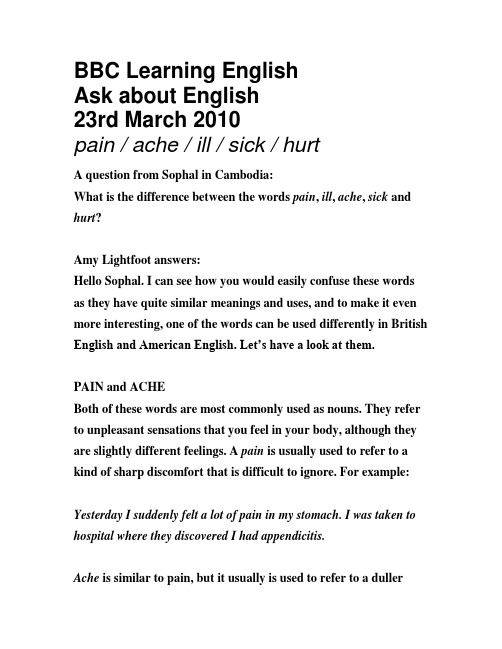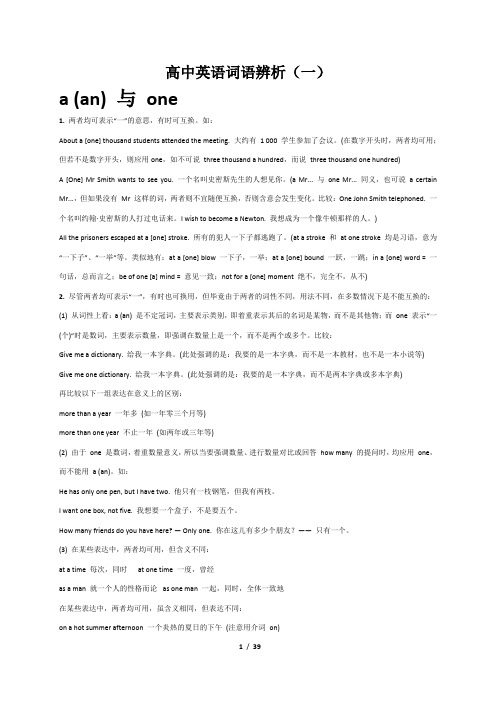ache与pain的用法辨析
- 格式:doc
- 大小:25.50 KB
- 文档页数:2

16 account, account for和onaccount of1 account作名词用时,通常表示四种含义。
(1)表示“思考,考虑”,为不可数名词,相当于thought,consideration。
We should take into account the bad weather.我们必须考虑到坏天气。
=We should take the bad weather into account.(2)表示“利益,利润”,为不可数名词,相当于profit,advantage。
He found his account in doing the work.他从做那项工作中受益。
She put her knowledge to good account.她充分利用自己的知识。
(3)表示“账,账目,账户”,为可数名词。
Her job is keeping accounts.她的工作是记账。
He opened an account with the bank.他在那家银行开了一个账户。
名词()表示“叙述,报道《事件、人物)”,为可数She gave us an account of her life there.她给我们讲述了她在那里的生活。
Please give us a full account of what happened last night.请详细向我们说明昨晚发生的事情。
2 account for为短语动词,意为“说明(原因),解释(理由)”,相当于explain,give the reasonfor。
He can't account for his absence.他不能说明缺席的原因。
How do you account for your behaviour?你怎样解释你的行为?③ on account of意为“因为,由于”,通常作状语,不作表语,相当于owing to,because of。

ache的用法
1. “Ache”可以用来表达身体上的疼痛哦,比如说“我的头好痛啊”(My head really aches!)。
就像被小锤子敲了一样,那种感觉可不好受呀。
2. 它也能形容心里的难受呢,像“我的心好ache”(My heart aches so much),这就好像心里有块石头压着一样,闷闷的。
3. 咱还可以说“我的背ache”(My back aches),这时候仿佛背了个重
重的包袱,累得很呐!
4. 当你思念一个人的时候也能用“ache”,比如“我对他的思念让我ache”(The missing for him makes me ache),就跟小猫挠心似的。
5. “ache”还能表示一种持续的状态呢,“我的牙疼了一整天了,还在ache”(My tooth has ached for a whole day and it's still aching),
哎呀呀,真要命。
6. 有时候难过也会用它呀,“我的灵魂在ache”(My soul is aching),是不是感觉很形象呢?总之,“ache”的用法好多好多呀,大家可一定要
记住哦!观点结论:“ache”这个词用法丰富又形象,无论是身体上还是
心理上的感受都可以很好地表达出来,大家要学会巧用它呀!。

pain的用法及词组一、概述疼痛是人类经常会遇到的感觉之一,它可以给我们身体发出警告信号,提示我们可能存在某种问题或伤害。
疼痛常常伴随着各种情况,不仅存在于我们的日常生活中,也出现在医学领域和文学作品中。
其中,“pain”(疼痛)是代表这种感觉的英语单词。
本文将介绍“pain”这个词的用法及相关词组。
二、Pain的基础意义Pain作为一个名词,在基础意义上表示身体或心灵上的不适感受。
它通常与肉体损伤、刺激或心理困扰有关,带来明显的不快感知。
例如:1. He is in pain after the surgery.(手术后他很疼。
)2. Emotional pain can be just as distressing as physical pain.(情感上的伤痛和生理疼痛一样令人苦恼。
)三、Pain与各种身体部位相关的词组1. Headache (头痛)Headache 是与头部异常感受相关的一种最常见形式。
它可能由多种原因引起,如压力、偏头痛、感冒等。
例如:- I've had a headache all day.(我整天都头疼。
)2. Toothache (牙疼)Toothache 是牙齿异常感受相关的词组。
它可能是由蛀牙、感染或其他口腔问题引起的持久性疼痛。
例如:- I can't eat because of this terrible toothache.(这个可怕的牙疼让我无法进食。
)3. Back pain (背痛)Back pain 是指出现在背部的隐隐作痛或剧烈刺痛等不适感受。
它可能是由肌肉劳损、脊柱问题或其他健康情况引起的。
例如:- He often complains about his chronic back pain.(他经常抱怨自己患有慢性背痛。
)4. Stomachache (胃痛)Stomachache 用于描述发生在胃部区域的不适感受,通常与消化系统问题相关。

BBC Learning EnglishAsk about English23rd March 2010pain / ache / ill / sick / hurtA question from Sophal in Cambodia:What is the difference between the words pain, ill, ache, sick and hurt?Amy Lightfoot answers:Hello Sophal. I can see how you would easily confuse these words as they have quite similar meanings and uses, and to make it even more interesting, one of the words can be used differently in British English and American English. Let’s have a look at them.PAIN and ACHEBoth of these words are most commonly used as nouns. They refer to unpleasant sensations that you feel in your body, although they are slightly different feelings. A pain is usually used to refer to a kind of sharp discomfort that is difficult to ignore. For example:Yesterday I suddenly felt a lot of pain in my stomach. I was taken to hospital where they discovered I had appendicitis.Ache is similar to pain, but it usually is used to refer to a dullerkind of discomfort that may continue for longer than a pain might. Common examples are:Headache, stomach ache, backache, heart ache.Note that heartache is used to refer to a kind of emotional pain, for example if you are in love with someone and they are not treating you well you can say He is causing me a lot of heartache.Less commonly, both pain and ache can be used as verbs. Pain in this form means to cause someone unhappiness. Note that you cannot use pain in the progressive or continuous form in standard UK or US English.It pains me to think of you being so unhappy with your life –meaning it makes me feel unhappy that you are so sad.You can also use ache as a verb. Unlike pain, ache can be used in the progressive form. For example:My back is really aching.I wish my leg would stop hurting, it really aches.Interestingly, you can also use the expression ‘aches and pains’ to refer to a general feeling of being unwell. Now let’s have a look atsick and ill.SICK and ILLBoth of these words are most commonly used as adjectives as in:I feel sick.Ed had to leave school early because he was ill.In American English, these two words have more or less the same meaning – they refer to a feeling of being unwell, whatever the problem might be. On the other hand, in British English, they have more distinct meanings. Sick most commonly refers to feeling as if you are going to vomit, as in: I think I’m going to be sick…while ill refers to any other feeling of being unwell. However, there are some phrases which are commonly used where sick has a more general meaning. For example: I’ve been off sick for ten days. –meaning I haven’t been to work/school for ten days because I’ve been feeling unwell.Sick can also be used as a noun to refer to vomit. For example:If you have children, you can be sure that you will have to clear up some sick at least once during their childhood.HURTHurt is a little bit different to the others in that it is commonly used as a verb and an adjective and, less commonly, as a noun. Of the above words, hurt is probably most similar to pain and ache and it can also mean the same as injure or injured. The key difference between hurt and pain and ache is that usually if you are hurt, it means the discomfort you experience is clearly caused by something outside of yourself. However, pain and ache suggest a more internal reason for the unpleasant physical feeling. Here are two examples:Be careful on that ladder, you might hurt yourself if you fall – used as a verbHe was badly hurt in the train crash – used as an adjectiveWhen it’s used as a noun, hurt usually refers to some emotional pain. For example:When he told her he wanted a divorce she could hear a lot of hurt in his voice.As you can see, the five words we have discussed here are similar in their general meaning but are quite different in their specific use. I hope it’s bit clearer for you now and that my explanations haven’t hurt your head!________________________________________________________________________。

高中英语词语辨析(一)a (an) 与one1.两者均可表示“一”的意思,有时可互换。
如:About a [one] thousand students attended the meeting. 大约有1 000 学生参加了会议。
(在数字开头时,两者均可用;但若不是数字开头,则应用one,如不可说three thousand a hundred,而说three thousand one hundred)A [One] Mr Smith wants to see you. 一个名叫史密斯先生的人想见你。
(a Mr... 与one Mr... 同义,也可说a certain Mr...,但如果没有Mr 这样的词,两者则不宜随便互换,否则含意会发生变化。
比较:One John Smith telephoned. 一个名叫约翰·史密斯的人打过电话来。
I wish to become a Newton. 我想成为一个像牛顿那样的人。
)All the prisoners escaped at a [one] stroke. 所有的犯人一下子都逃跑了。
(at a stroke 和at one stroke 均是习语,意为“一下子”、“一举”等。
类似地有:at a [one] blow 一下子,一举;at a [one] bound 一跃,一跳;in a [one] word = 一句话,总而言之;be of one [a] mind = 意见一致;not for a [one] moment 绝不,完全不,从不)2.尽管两者均可表示“一”,有时也可换用,但毕竟由于两者的词性不同,用法不同,在多数情况下是不能互换的:(1) 从词性上看:a (an) 是不定冠词,主要表示类别,即着重表示其后的名词是某物,而不是其他物;而one 表示“一(个)”时是数词,主要表示数量,即强调在数量上是一个,而不是两个或多个。

16 account, account for和onaccount of1 account作名词用时,通常表示四种含义。
(1)表示“思考,考虑”,为不可数名词,相当于thought,consideration。
We should take into account the bad weather.我们必须考虑到坏天气。
=We should take the bad weather into account.(2)表示“利益,利润”,为不可数名词,相当于profit,advantage。
He found his account in doing the work.他从做那项工作中受益。
She put her knowledge to good account.她充分利用自己的知识。
(3)表示“账,账目,账户”,为可数名词。
Her job is keeping accounts.她的工作是记账。
He opened an account with the bank.他在那家银行开了一个账户。
名词()表示“叙述,报道《事件、人物)”,为可数She gave us an account of her life there.她给我们讲述了她在那里的生活。
Please give us a full account of what happened last night.请详细向我们说明昨晚发生的事情。
2 account for为短语动词,意为“说明(原因),解释(理由)”,相当于explain,give the reasonfor。
He can't account for his absence.他不能说明缺席的原因。
How do you account for your behaviour?你怎样解释你的行为?③ on account of意为“因为,由于”,通常作状语,不作表语,相当于owing to,because of。
八年级下册英语单词用法总结Unit 1 W hat’s the matter?重点单词与短语①matter 【例句】What’s the matter?怎么了? 【用法】(1)matter意为“麻烦”,与worry同义,其后面常跟介词with。
(2)“It doesn’t matter.”可以用于回答道歉,意为“没关系”,表示某事不是很重要或抱有无所谓的态度,相当于Never mind。
(3)“no mat ter+疑问词”引导让步状语从句,意为“不管;无论”。
◇sore辨析:sore,ache,painsore 常指因发炎而引起的肌肉疼痛,它常与身体部位连用。
ache 常指持续性的疼痛,它常与表示身体部位的名词结合构成复合词。
pain 常指肉体上的剧烈疼痛,它通常不与身体部位名词连用,而用在动词短语中。
◇foot(feet) 搭配:on foot 步行foot by foot 一步步地;逐渐地at the foot of… 在……脚下stand on one’s own feet自食其力例句:It’s easier to get there on foot than by car.到那里去,步行比乘车方便。
◇lie(lay,lain,lying) 搭配:lie down躺下【用法】lie 可意为“平躺;位于;撒谎”,其相应的过去式、过去分词有所不同,而且lay也有“放置;下蛋”的含义。
如下表所示:原形含义过去式过去分词现在分词lie 躺;位于lay laid lyinglie 放置lied lied lyinglay 放置;下蛋laid laid laying②rest 搭配:have/take a rest 休息 a rest day休息日【联系】rest 还可以作名词,意为“剩余部分”。
当rest表示“剩余的人或物”时,是集合名词。
与the 连用做主语时,谓语动词的数要看具体情况而定。
◇break 搭配:take breaks(take breaks;have a break)休息do sth. without a break 不停地做某事lunch break午餐休息时间例句:You need to take breaks away from the computer.你应当休息一下,不要玩电脑了。
pain的用法和搭配Pain是一个非常常见的英语单词,它的基本意思是“疼痛”,通常用来描述身体或心理上的不适感。
在日常生活和医学领域中,我们经常会遇到这个词,因此了解它的用法和搭配是非常重要的。
1. Pain作为名词作为名词,pain通常指身体或心理上的疼痛感。
例如:- I have a pain in my back.(我背部有疼痛感。
)- She suffers from chronic pain.(她患有慢性疼痛。
)- He takes painkillers to relieve his pain.(他服用止痛药缓解他的疼痛。
)除了表示具体的身体或心理上的不适感之外,pain还可以表示折磨、苦恼等精神上的负担。
例如:- The pain of losing a loved one is indescribable.(失去所爱之人的痛苦无法言表。
)- She felt the pain of rejection when she didn't get the job.(她在未被录用时感受到了被拒绝的痛苦。
)2. Pain作为动词作为动词,pain通常表示“使某人感到疼痛”,也可以表示“给某人带来痛苦、困扰”。
例如:- The injection will pain you for a moment.(注射会让你感到一瞬间的疼痛。
)- It pains me to see him suffer like this.(看到他这样受苦我感到很难过。
)3. Pain的常见搭配除了上述用法之外,pain还有一些常见的搭配,如下所示:- feel pain:感到疼痛- suffer pain:遭受疼痛- alleviate pain:缓解疼痛- chronic pain:慢性疼痛- sharp pain:剧烈的疼痛- shooting pain:刺骨的疼痛- dull ache:隐隐作痛的感觉- excruciating pain:极度剧烈的疼痛总之,Pain是一个非常常见且重要的英语单词,在日常生活和医学领域中都有广泛应用。
同义词及反义词(1)a/an【同义词】one【辨析】a与an在现代书面英语中,a与an表示“一(个)”时,a的形式用于以辅音(读音)开头的单词前(a useful book,,a euphemism);an的形式用于以元音(读音)开头的单词前( an orange,an hour)。
【辨析】a/an与onea/an与one都表示“一(个)”a/an侧重类别;one侧重数量.在整数、整千数词前可以互换。
ability【同义词】capacity/ capability/skill【反义词】inability【辨析】ability与capacity,talent, skillability指智力或体力上做事情的能力,后面接不等式(即:ability to do sth.)或介词for /in (即:ability for / in doing sth。
);capacity指天赋的,如生长、发展或成功的潜力,后面可接for介词短语;talent强调天生的才能,尤其是在艺术方面的才能,后面也接“for (doing) sth”介词短语;skill则强调由经验而获得或发展的能力,后面接“in (doing)sth"介词短语。
able【同义词】capable / efficient / qualified / skillful【反义词】un able/ incapable【辨析】able与capableable强调做某事的能力或才干。
capable强调“有能力的;有效率而精干的”.able表示“能够做(…事)时,不置于名词之前,而用于“be able to sth。
"的句型中。
capable + of doing sth时表示“有…能力,能够做…”,当表示“有…可能性时"一般不置于名词之前。
【辨析】be able to与can (could)be able to 与can都可以表示“可以,有能力”,表示一般能力时可以互换.主要区别是can没有将来时和完成时,而be able to可以有各种时态.在shall,will, have后面要用be able to。
新课标2011北京市高考考试说明英语词汇规范释析词语辨析汉语部分A1、Ability是指智力或体力上具有做某事的能力。
Skill强调由经验而获得或发展的能力。
2、be able to 和can都有“会”“能够”的意思。
但是can只有现在和过去两种形式,表示一半意义上的能力;如果想用将来时或完成时表示“能够”,则一定要用be able to,且其可以用来表示完成某一具体事情的能力。
3、above,over和on作为介词,都有“在……上面”的意思。
三者的不同点在于:above表示在某物的上方或位置高于某物,不一定有正上方的含义;over指在某物的正上方,有覆盖之意;on则指两个物体表面接触,一物在另一物上面。
如:His room is above mine on the third floor.他的房间在三楼我的上面。
His room is right over mine.他的房间在我的正上方。
There is a book on the desk.桌上有一本书。
4、receive强调客观收到的动作,而未必接受;而accept强调主观上的接受。
如:I received a gift from him,butI didn’t accept it.我收到了他的礼物,但我没有接受。
5、ache和pain作为名词,都有“疼痛”的意思。
ache一般指局部或持续的疼痛,常和身体部位的名词构成复合词;pain指肉体上或心灵上的痛苦,可以是局部的,也可以是全身的;可以是短暂的,也可以是持续的。
如:He has a stomachache today.他今天胃疼。
She was crying with pain after her head was broken.她的头破了疼得在哭。
6、achieve,gain和get都有“获得”的意思。
三者的区别在于:achieve指通过努力而获得成功或达到某种目的;gain指通过努力或奋斗,获得某种利益、好处或经验;get是通用词,指用某种方法或手段得到某种东西,可以主动获得,也可以被迫“接受”。
ache与pain的用法辨析
两者均可表示“疼痛”,区别如下:
1. ache 主要指肉体局部持续的疼痛或隐痛;而pain 的应用范围则较广,可指轻微的痛或剧烈的痛,可指局部的痛或全身的痛,可指持续的痛或突发的痛等。
如:
The ache in his back lasted for two days. 他的背痛了两天。
The boy cried with pain. 这男孩痛得哭了起来。
注:有时两者都可用。
如:
I have an ache [a pain] in the back. 我背痛。
有时两者可连用。
如:
My body was all aches and pains. 我浑身疼痛。
2. 由于ache 通常用于指局部的持续性疼痛,所以它经常与某些表示身体部位的词构成合成词,表示身体的某处疼痛(此时通常不用pain)。
如:headache (头痛),toothache (牙痛),stomachache (胃痛),earache (耳痛),backache (背痛),等等。
另外注意:这些带-ache 的复合词,除headache 为可数名词外,其余的则既可用作可数名词(主要见于美国英语),也可用作不可数名词(主要见于英国英语)。
3. 用于引申义表示精神或感情上的痛苦时,通常用pain。
如:
The death of his father gave him much pain. 他父亲的死使他很悲痛。
His harsh words caused her much pain.
他说的话很刺耳,她听了很不舒服。